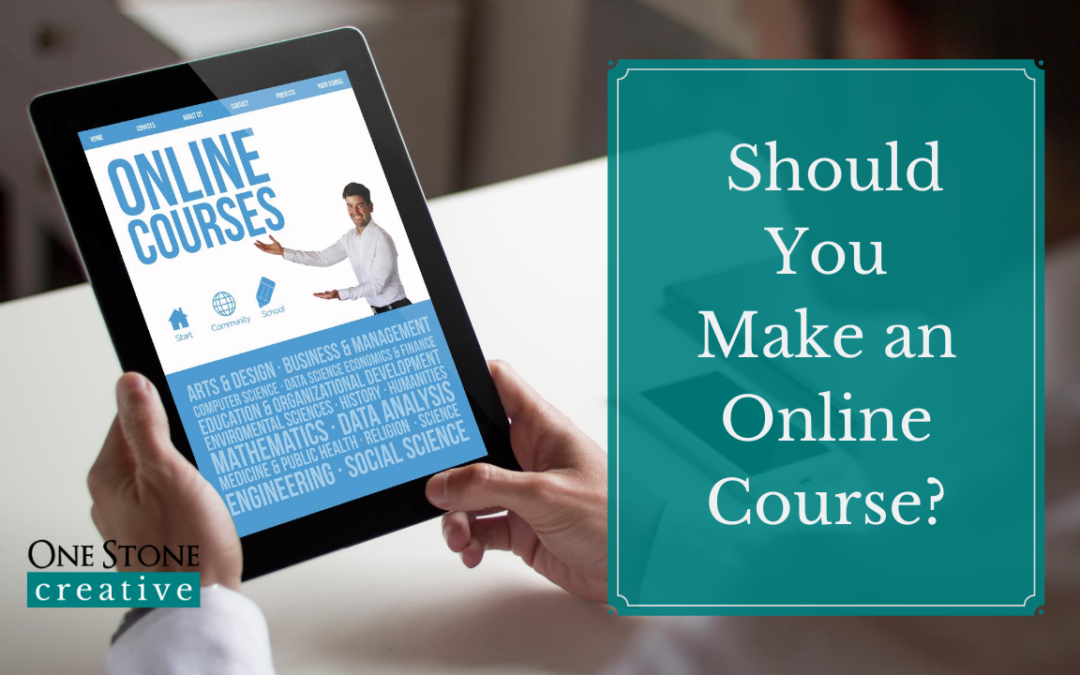There is a lot of training and information out there about how to create a course.
So much.
So. So. So. Much.
There are consultants, and done-for-you services, and group programs and teachers, and, of course, courses on how to make courses.
It sounds amazing, right? Put in some work at the outset, and then sell your valuable information many times over to people who can genuinely benefit from it.
What could go wrong?
I’ll tell you what can go wrong, but first, I’ll tell you how I know.
I started my internet marketing career helping to make online courses then teaching people how to do the same, way back when they were a much newer and shinier idea than they are now.
I’ve consulted on several massive courses and course launches, and I supported scores of entrepreneurs creating courses of their own.
While there are exceptions – people who genuinely want to help and provide useful information – broadly speaking, it’s a shitty industry. Up there with superfood supplements and cryptocurrency, online courses get billed as one of the ultimate ways to scale up an internet business. Still, more often than not, they are pipe dreams that suck up time, money, and energy better spent on delivering service and knowledge differently.
This isn’t to say that there is never a case for an online course – plainly, that’s not true. And it’s also not to say that getting help and support when you DO want to develop a course isn’t a good idea – it is!
But I want to dispel some of the hype about them from an insider’s perspective. This way, you can make a strategic decision about whether a course will actually help you meet your business goals, or just distract you from them.
Let’s start with how people usually wind up creating courses.
What Making a Course Usually Looks Like
Creating courses usually isn’t the first step in an online business. Most people start with selling services, like coaching, consulting, marketing, bookkeeping – you name it. Anyone who has their own business online generally starts with selling what they know how to do.
And getting enough clients at the right price and at the right time is *hard.* It can take ages, and there’s all this admin that goes along with it and and and.
It can be a drag.
So, entrepreneurs start looking for insight and advice about how to do things differently – make things just a little easier or more secure or more profitable. You don’t have to dig deeply into the mess of “how to grow a business” content out there before you land on the idea of an online course.
Because there are SO many people talking about how to make them, you can find an online course trainer in every industry, niche, and demographic.
Let’s be real. Selling a course about how to make money selling widgets is way easier than selling the widget.
So you sign up for the training or the course or the program, and you get some instructions on how to outline your content, maybe record a video, and set up a funnel. Doing this poorly is fast and cheap. Doing it well is time-consuming and expensive. If you’re really lucky, your coach or teacher will tell you to pilot it first to validate the idea.
Then you have to sell it. As with most things, if you already have a big audience, it might go pretty well! If you don’t, it likely won’t.
Typically, a few people buy-in and then…crickets.
And it’s not (usually) because the content isn’t any good!
And it’s not (usually) because the AV is terrible.
And it’s not (sometimes) because the creator hasn’t spent time building an audience.
It’s not because no one actually uses the courses they buy. (Although most people don’t use the courses they buy.)
There’s another reason that online courses tend to cost more money than they make.
Why Online Courses Don’t Perform
It’s because the math isn’t actually that good for online courses.
Really. It sucks.
Most course trainers will tell you that there is a virtually unlimited pool of potential students for your course. Have you heard this one? I’m sure you have. Across the globe, hundreds of thousands of people with internet access are looking for information about YOUR area of expertise.
This may be technically true in the sense that there are over 7 billion people on the planet who exist and a significant portion of them have the ability to buy a course. And it may even be true that a not insignificant number of them are interested in the thing you teach!
But let’s think about things a little more critically.
How many people realistically:
- Are in your target demographic, and
- Are at a point in their lives or businesses where they are in the sweet spot between knowing they need a specific kind of information but where they can’t afford 1:1 help, or to hire it done for them, and
- Are familiar with the concept of online courses, and
- Are self-motivated enough to complete and make use of an online course, and
- Know you and your brand well enough to invest confidently, and
- Are in your sphere of influence – already in your community, or the community of people who will promote your course for you, and
- Have the time to take a course on a specific topic.
That’s not quite as many people as you thought, is it?
The real market for online courses is a lot smaller than most of us set out believing.
And the competition is fierce. This doesn’t mean a great course can’t be made, but like with podcasts – the more really good ones that are out there, the less successful the mediocre ones will be.
And that’s something essential to keep in mind. Unless you have a huge pool of the kind of faithful fans who will buy anything you create, your course has to be better than the other ones in your business area for anyone to be interested at all. Taking into account the actual size of the market as previously discussed and the investment required to make something excellent… the business case for it gets weaker and weaker in most situations.
Most business owners aren’t in a position to see the value out of an investment in creating an online course. Some are, and we’ll talk about that – but I want you to think about something first. Something that rarely, if ever, gets to be part of the conversation.
Why Make a Course at All?
When what you have is a hammer, then a lot of things start looking like nails. When you’re inundated with messages about how awesome courses are, they begin to look like the answer to all of your business challenges.
So back it up a couple of steps. What is the gain YOU expect to get out of an online course?
Is it passive income? The ability to reach more people? A way to cut down on the waiting list for your individual services? The respect of your peers?
Knowing why you want to create an online course is a crucial element when you’re considering making one because there are lots of other ways to grow your business and make money. A course might not be the best way to meet your business goals. Maybe you should have a live group training program instead, or a podcast, or a book. Perhaps a new coaching or consulting service.
Knowing why you want to create an online course is a crucial element when you’re considering making one because there are lots of other ways to grow your business and make money. Click To Tweet
Before really considering making an online course – that you then have to sell and support, remember, make sure that you’re thinking of all of the different ways you might be able to reach your business goals.
When You Should Make a Course.
Have I discouraged you enough? Do you feel like making a course would be a colossal waste of your time and money and energy?
No? Go back and reread the last three sections.
Yes? Excellent, this is the feeling you should approach the “should I make a course?” question with. A sinking feeling that, despite your best efforts and after exploring every single alternative, it is the best of all possible options.
Because sometimes making a course really is the best way to achieve a specific business goal, and help more people than you would be able to otherwise.
It’s a small sweet spot – but if you’re in it, then making a course is incredible. Here’s what that looks like:
If you’re always staring at an inbox of people who desperately want to pay for your help, and you just DO NOT have the time to do it, but given a little instruction, they could do it themselves, or have their own teams do it – well, then you’re in online course territory.
Likewise, if you have tons of potential clients who know you and respect your work, but regretfully, can’t afford your regular services, then a course can be a fantastic middle ground for them. They can gain some insight from and access to you in a way that doesn’t drain you.
Another situation where a course is a smart investment is if people are straight-up asking you for one. And not just one time someone saying, “omg, you should make a course on this!” I mean several unique individuals, at different times, UNPROMPTED, saying some variant of “I wish you had an online course that I could buy immediately.”
If that happens at least five times, from 5 different people – go ahead. Make a course.
Another good time to make a course is if you have a large pool of existing clients or other stakeholders who will get value out of taking it. An example of this might be a course on engaging professionally on Twitter, Facebook, and LinkedIn for all of your social media management clients. Or maybe you’re a non-profit working with a lot of volunteers, and you need them to be able to take training on their own time, at their own pace. In essence, if there are people who NEED information from you, a course can be a great way to give it to many of them at once.
Finally, a free course (which still needs to be high quality!) can be an excellent way to build your email list or community. Note that this is FREE. This can be to educate the broader world about your subject matter area so that a percentage of them will ‘graduate’ to becoming clients, and to build out your list for sales of related products or services. (Think of an online accounting course offered by a bookkeeping software.)
And course-wise – that’s about it.
If you’re in one of these situations, or you’re not, but you’re still thinking “I should make a course” then you need to have four elements well in hand before you start:
- You have to be an expert, or expert enough, to competently and confidently teach your subject matter. You don’t need to be the world’s leading authority, but you should be able to answer questions on the fly, and as a rule of thumb, talk about the subject matter for an hour or four without prompting or interruptions.
- You are willing to pilot first to validate the idea. This is critical. You can make your absolutely best guess, informed by as much research as you can do, but still have faulty assumptions about who wants to buy what in what format from you. Pilot. Pilot. Pilot. Pilot. (A pilot is the ‘quick’ n’ dirty’ version of your course, usually delivered live, to a small group of people. You do this to ensure that people will buy it from you, on your topic and actually learn the things. If your first pilot goes well, either do another one or start a full course build.)
- You have to have either weeks of available time to create content, be able to afford thousands of dollars to have something professionally made, or have a big enough audience that likes you well enough to tolerate inferior quality audio-video materials. (Yes, many big names make absolutely bargain-basement quality learning materials. This is because they have enough social capital that they do not need to demonstrate respect for their students by producing quality materials. It is 100% a lack of respect if they do not provide excellent quality learning materials. I really hate this.)
- You have to have an audience big enough with enough disposable income that you can make a profit on a 1% – 3% conversion rate. Or you have to have relationships with people who have a large audience and are willing to promote your course for an affiliate commission. If your course is for internal use, or free, you can ignore this one. You can also ignore this one if your course is designed as a loss leader for your other products or services.
Do You Want to Make a Course Now?
This post has been kind of a Debbie Downer-type post, so I want to be clear: I *love* making courses.
It’s fun.
Every single step of the process from piloting, tracking assumptions, learning how people learn to developing resources and infrastructure, creating cool audio and video techniques, exploring new accessibility functionality, learning management systems, and integrations are enjoyable. Compound that with onboarding campaigns, affiliate partnership development, launches, and automation, and you have a massively satisfying and creative challenge. It scratches every professional itch I have.
But that doesn’t make it a smart fit for most business owners.
It might be for you, and it might not. If it is – and you know that you’re in a position where:
- More people want to hire you than you can help, or
- Many people want to hire you, but can’t afford 1:1 time with you, or
- Your current clients, colleagues or audience need it to work most effectively with you, or
- It’s a strategic list-and-community-building investment, or
- Many people have asked you, specifically and unprompted, for one,
Book a course validation call with me, and let’s talk about making the magic happen. (Call is $250 which is refunded if we decide you shouldn’t make a course, or that you should make a course but not with me, and applied to the mandate if we move ahead together)
About the Author

Megan Dougherty is the Co-Founder of One Stone Creative. She has been a digital marketer for over a decade, with a strong focus on digital course creation, content marketing and multi-media content production. As the co-founder, she takes pride in high-quality, on-time work and helping people get their messages to the people who need to hear them. She likes spreadsheets, deadlines and creating online experiences that are good for both the creators and the end-users. She hates jumping out of airplanes, mushrooms, and hyberbolic language in messaging. When not helping to produce podcasts, courses, and videos, she bakes pies and watches Star Trek. (Janeway forever.)




